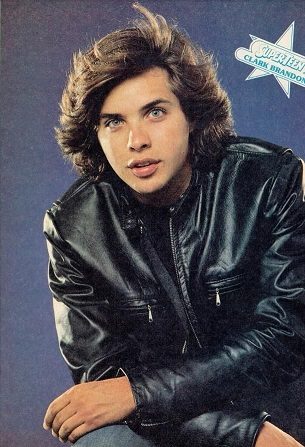
Good people: The Clark Brandon interview (Part 1)
One thing I’ve learned over the years is that if you don’t ask, you don’t get. I still suffer from great fear that I will “look stupid” if I ask for something, but I’ve also learned that “looking stupid” to someone who has no idea who you are isn’t that big a deal, so if I have nothing to lose, I tend to ask.
As I was writing the recaps for The Ballad of Jo and Eddie, I came across some contact information for Clark Brandon, the actor who played Eddie. I battled my impulse to not look stupid and I sent him an e-mail about the blog. I also asked him if he would be open to doing an interview with me.
A few days later, to my surprise and delight, he responded positively! We spent several weeks communicating to set up a time to conduct a Skype interview. On September 23, 2015, we were able to virtually come together to find out everything I wanted to know about both Eddie Brennan and Clark Brandon, and I’m happy to share it with you. What I learned most of all is that Clark Brandon is good people, and I’m extremely delighted to have had the opportunity to connect with him.

He was nice enough to speak to me for a very long time, so I’m going to post the interview in parts, divided in ways that seem logical to me.
Please now enjoy Part 1: Not much on TV in the early 80s made sense.
On having people ask him about Eddie in 2015
There were a lot of shows that I was a regular on, and on Facts of Life I just guested four or five times – I did a season opener, or a closer – but that’s the one that gets me the most reaction. It’s been thirty-plus years, and I still get it all the time. That just shows you the difference between my shows, which were not hits, and that show, which was a huge hit! The numbers are different. Everyone watched [Facts] back then. And if you’re part of that generation, it was a big part of you. Certainly for girls. It was almost – I don’t want to say “groundbreaking,” but it was in a way.
VO: I would certainly say “groundbreaking.” In fact I do in just about every other post.
It’s the one show that I get the most memories and attention from people. It was a huge show. I was honored to be on it, and honored to be with Nancy, and the whole cast. It was a great cast. And I appreciate and respect where you come from, following and blogging about the show. It was an important part of a lot of people’s TV history, so I appreciate it.
On being among the 80s Tiger Beat cover boys
I think [the 70s and early 80s] was the peak for those magazines. Their circulation was six-hundred- to eight-hundred-thousand. I came from an actor’s family. My father was a New York actor. So it was sort of a craft for me, and [the magazines were] a place that I liked to use if I was working. If I wasn’t working, I still had to do it. Almost every day I was doing a shoot for a magazine or a syndicate or something. I was constantly doing photo sessions. It felt weird if I wasn’t promoting anything. I got a vibe like, “What am I, a piece of meat?”
I treat him like a piece of meat in all my blog posts, and now I feel bad about it. Or a piece of tofu I guess. I’m a vegan.
But luckily through those years, I had a show of my own or I had a show to promote, so it was usually a very useful tool. I was extremely appreciative of the magazines, especially Tiger Beat. That’s the one I really favored and did most of my work with. My first manager before I did any television was a guy named Bob Lemond. He came out of New York with a client and got him in a TV show. That client was John Travolta. Bob’s strategy in the early days was, “If you want to talk to John, then you have to talk to this guy.” This guy who’s nothing [chuckles]. So he used John’s power to get me into that market, which helps. It helps with hiring if they say, “Everyone knows Clark because he’s on that magazine, and it can help our TV show.” So it was useful. I used it mostly as a tool to promote the work I was doing. It did get a little boring to talk about my ten favorite whatever.
VO: The November 1979 cover of Tiger Beat touts, “Be Clark’s Guardian Angel!”
Oh yeah.
VO: What was that all about?
Well, that was from a show called Out of the Blue with Jimmy Brogan. It was kind of a dark show and concept. It was about a family that lost their parents, and the aunt came to take over the family. It was Dixie Carter, and the idea was that she was the last person on earth who should raise a family. So a guardian angel came down to watch over them, and to take care of the kids, because Dixie’s character was very busy all the time and couldn’t be bothered with a family. It was by the producer of Mork and Mindy and Happy Days. It was actually called a Mork and Mindy spin-off. Robin [Williams] did our pilot. It made no sense whatsoever. Why was Mork coming to Chicago to see Jimmy Brogan? I think Jimmy Brogan started on Mork as an angel, so they were trying to cross-promote it all the time. It didn’t make any sense, but not much on TV in the early 80s made sense anyway. But that’s why the guardian angel line became very popular. That was kind of a fun experience; it was right on the Paramount lot during Taxi and Happy Days. We were lodged in with Taxi on one side of our stage, and Mork and Mindy on the other side of our stage. It was a crazy place to work in those days. I think they were shooting Urban Cowboy on the lot then. It was a fun show. I hate to say it, but it was a wonderful way to be in your twenties.
VO: I’m not sure why you hate to say it. It sounds great!
Well, there were down sides, of course.
VO: Would you like to talk about some of those?
I think in your twenties being famous is difficult. You’re trying to develop who you are, and yet you have this huge focus on who you should be, or who you’re perceived as, or as this thing that you can never really be. Bigger than life. I felt sort of an imbalance because of that. I would have liked to have had more fame in my thirties when I was more sure of myself and my identity, rather than going right into this job at eighteen years old. It wasn’t huge fame, though, it was just TV fame. It wasn’t anywhere near nowadays when you really can flood the media. But it was enough for me to feel, “I’m not that kind of person. I’m not that guy.” And a lot of people, even my friends, would say, “Oh, you have changed since you got on TV.” They assume that immediately. And I think what I felt was that everyone else had changed about me. I was the same person, with different complexities and challenges, but I think I was quite level-headed. As I said, I came from an actor’s family. My dad was a huge soap opera actor in the 60s and 70s so it’s nothing that was new to our family. But it just would have been mellower if I could have coasted a little through my twenties, and then as I became sure of myself, then have that sort of attention. That was the one thing I noticed. I didn’t particularly like being famous.
VO: Were you close or friendly with any of the other cover boys of the time? Scott Baio, or a Cassidy?
I went to school with Shaun [Cassidy] at Beverly High. We were in the same grade. I knew Scott [Baio] very early on. My first show was with Jimmy McNichol, so I became really close with both him and Kristy [McNichol]. And Kristy and Scott were good friends, so I knew Scott when he first moved to Los Angeles and lived in a tiny apartment with his family. I still bike ride with Leif Garrett every weekend.
On early Facts and his first episodes
I thought Nancy was amazing for that show. She turned that show around, I think. The first show I did was the first time they broke the top ten, and they never went down from that. It wasn’t me. I think Nancy was the missing element. The show went through three or four casts, and they almost said, “Eh, screw it.” But then bang – they found Nancy, and she just connected with everyone. She’s a fine actress. All of them were, but she was that missing element that really glued that cast together.
VO: One of the things I’ve commented on when I recapped the episodes is what I see as extraordinary chemistry between you and Nancy.
Yeah, but there certainly wasn’t anything romantic! I was a few years older than her. That was a credit to her acting talent, and a credit to her ease to perform with, and just really a chemistry. We were completely different. I used to be on my show, and [Facts] was a five-day schedule: three days of rehearsal, two days of camera, with the second day being shooting. I could only come on that Friday, so I would jump into rehearsal when they were doing camera rehearsal. Maybe I could come on that Thursday afternoon, but usually I didn’t get rehearsal with them, because I was usually shooting my own show. So it was a credit to her to be able to deal with that. And it was a fun two characters. It was really innocent, kind of fun. I love New Yorkers. I’m a New Yorker. I’m not quite Eddieish, but I love New Yorkers and so Nancy and I fell right into that rhythm. I was very pleased to work with her, and it did show sometimes.
VO: Were you cherry-picked for Eddie or did you go through an audition process?
I don’t really remember but I remember typically always having to audition. Even the series I used to get, I would start with everyone else, just with a casting agent. So I don’t think I was called up and told, “Hey Clark, I’ve got a great role for you.” I could be mistaken, but I don’t ever remember being an actor just fielding roles. I was always scrapping from that first audition with a hundred kids and trying to get through that. Which I liked! I think you earn your money in your auditions! Once you get hired you’ve got a crew that makes you look good and everything. In an audition, you don’t know the material, there’s a ton of pressure, it’s competitive. I worked on my skill in the audition. Your heart’s pounding, you’re reading against some secretary who is not even looking at you, and you have to sell it. I always liked the audition process. In fact, everyone else always felt more pressure on the eighth callback or whatever. By that time, I thought, “They like me. Even if I don’t get the job, at least I know they like me enough to bring me back so many times.” So the more I got asked back, the mellower I got. That first one was always the most difficult.
VO: Your first two episodes were the two-parter: The “Teenage Marriage” episodes, which ended with Jo realizing she can’t marry Eddie right now, poor Eddie is heartbroken, and he takes off to catch the midnight bus to the base in Chicago. Do you remember anything about that?
There’s one thing that I always laugh about. You know, I was always wearing that peacoat.
VO: Right.
And then under that peacoat I had the Navy uniform, which is wool about three centimeters thick, so I was always sweating my tail off. I don’t remember if it was the final scene of that one or another one, but I remember it was a last scene – a goodbye scene. We’re face to face, and the camera is on one side of me, and I all of a sudden feel this sweat come down. And I say, “Oh fuck,” ‘cause actors never sweat. So I kind of turn away from the camera, and the sweat lands right here into my eye. And then I say, “Wait a minute,” and I turn back, and right when I turn back, the sweat comes right out of my eye and it looks like a tear! And after we cut, Asaad, who was the director – I’m sure you know that name.
VO: Oh yes, Asaad Kelada.
Yes! He said, “Clark, that was so great! That tear came right down! Unbelievable acting!” That was a great thing about shooting those three- or four-camera shows. It’s like live. Anything goes. You work it. I always remember that as being fortuitous because there’s no way I was able to do that. Nancy could. She could do tears in a second. She could do anything. She was great at acting. But I just had to rely on my sweat glands.
After our interview, of course I went back to find that scene. It turns out that it isn’t in the “Teenage Marriage” episodes, but rather in his final episode, “Seems Like Old Times.” He remembers it being the result of the peacoat plus the navy uniform, but it looks like just the peacoat and the climate of Edna’s Edibles were to blame.
It’s hard to see in the screen cap, but here you get the first glimpse of the sweat bead:

Oh fuck fuck fuck this sweat bead is rolling into my eye and I don’t want to make us cut the scene. Maybe it will just look like I feel bad because I’ve just destroyed Jo.

OK, OK, it’s out of my eye now. Maybe no one will see it.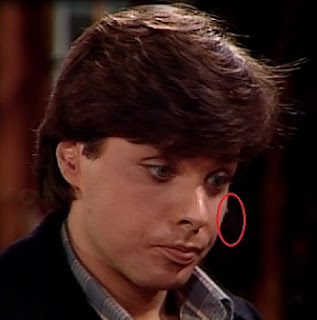
Hot damn, now that mofo looks like a kick-ass tear that done rolled all the way down my cheek!

We continued to talk about the other episodes he filmed, his life after Facts, and what he’s doing now as an educational administrator. Tune in tomorrow for part two of Good People: The Clark Brandon Interview.


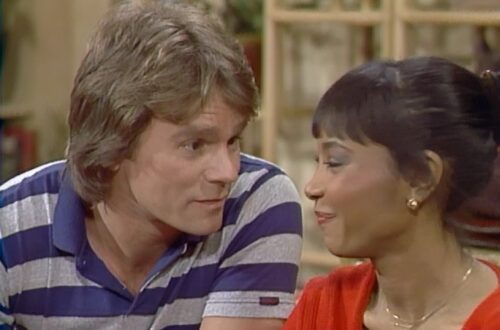
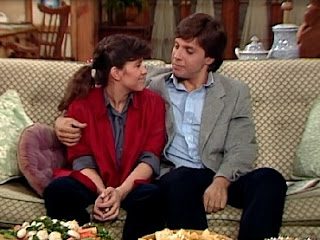
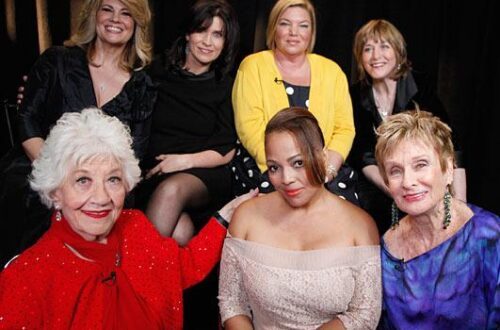
2 Comments
RJ Guy
Thanks for posting this!
ZATZA
Me encanta este actor. Me trae grandes recuerdos de mi juventud. A diferencia de Clark, pienso que los shows de los 80¨s fueron los mejores. Gracias.